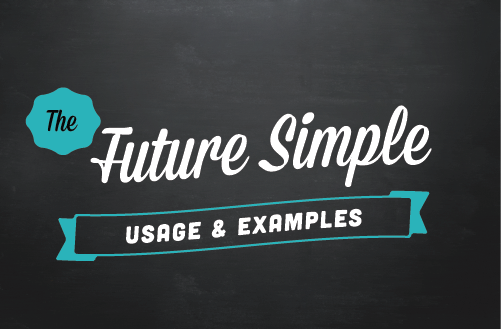Using the Future Simple Tense
(will / shall / be going to)

Are you wondering when to use the future simple tense? When do we use "will," "shall," and "be going to" to express the future? In addition to the explanations given here, there are lots of examples to make things clear.
[Note: Click here to learn how to form the future simple with "will" / "shall".
Click here to learn how to form the future simple with "be going to" + infinitive]
Before we look at all of the uses, please note that "will" and "be going to" are more frequently used in the future simple than "shall."
Future simple tense use #1: Spontaneous (unplanned) future decisions (will)
We use "will" to express a decision that we make spontaneously in the present moment.
Examples:
- (The phone rings) I’ll answer it.
- Is it midnight already? I think I'll go to bed now.
- Oh, and I'll also take a kilo of oranges please.
- (After looking out the window) It's nice outside. I won't drive today. I'll walk or ride my bike.
Use #2: For future facts (will)
We can use "will" to describe future facts.
Examples:
- Tomorrow, the sun will rise at 8:30 and will set at 5 PM.
- The president will serve a four-year term.
- Who will host the next World Cup?
- Next year, we will offer evening classes.
- The police will not release additional information.
Use #3: Predictions based on opinion (will / be going to)
We can use "will" or "be going to" make predictions:
(1) to express opinions about things that may happen in the future; or
(2) to make assumptions about the future based on something that's happening now.
We often use "think" to express an opinion.
Examples:
- I think it will rain tomorrow. / It'll rain tomorrow. (an opinion )
- The clouds are coming out... It's going to rain. (an assumption based on the clouds)
- It will be a boring meeting as usual.
- Do you think John will come to work today?
- Who do you think will win the World Cup?
- I think it’s going to be hot today.
- I'm sure her class will finish late again.
- It’s going to be an interesting discussion.
- I don’t think he’s going to call me again.
- Do you think the plane will arrive on time?
Use #4: To express a future plan (be going to)
We use "be going to + infinitive" to describe an arrangement that we plan to do in the future.
This can be tricky for learners. We do not use "will" for things that we've already arranged or decided to do. As noted above, we use "will" for things that we decide to do right at that very moment.
(Please note that we can either use "be going to" or the present continuous to express a future plan). The present continuous and "be going to + infinitive" are formed in a similar way).
- We're going to see a movie tomorrow tonight.
- After the movie, we're going to have dinner at the pizzeria.
- Is Michael going to come?
- My boyfriend and his best friend are going to join us for dinner.
- We're all going to meet in front of the cinema at 7 PM.
Use #5: Future plans / decisions with the main verb "be" (will)
As noted above, we use "be going to" to express future actions that are planned in advance and "will" for spontaneous decisions. However, if the main verb is "be," we can use "will" to express a future action - even if it is for a firm plan or decision made in advance.
Examples:
- We'll be in Washington tomorrow for a conference.
- Will you be at home later?
- Yes, I'll be at home this evening.
- I won't be at the office next week.
- The director won't be happy about this.
Use #6: To express willingness / unwillingness (will)
We can use "will" to show that we are willing or voluntarily agreeing (or not willing or agreeing) to do something in the future.
This includes making promises that we will do something and making requests or asking people if they are willing to do something.
Examples:
- I will get the children after school.
- She'll bring the materials to your office.
- I'll be happy to help you.
- He won't do it for free.
- Will they deliver the furniture to my home?
- My parents won't buy me a new phone.
- I promise I will come home by midnight.
- Will your boss approve your vacation request?
- Will you make dinner tonight?
Use #7: To make an invitation (will)
We can use "will" in the future simple tense to invite people to future events.
- Will you marry me?
- Yes! Will you come with me to tell my parents the good news?
- My sister is getting married. Will you go to the wedding with me?
- I'm engaged! Will you come to my bachelorette party?
- Will you attend my daughter's wedding?
Use #8: To make an offer or suggestion (shall)
"Shall" is used with the "I" and "we" forms to make offers and suggestions using questions. (Note: We don't use "shall" for "you / he / she / it / they" when we make offers and suggestions).
Examples:
- Shall I get something for dinner?
- Shall I help you carry those heavy boxes?
- Shall we pick you up at the airport?
- We've worked a long time. Shall we take a 15 minute break?
- Shall I open the window? It's hot in here.
- Shall I bring a bottle of wine to the party?
- You look tired. Shall we go to sleep now?
- Parking will be difficult. Shall we take a taxi tonight?
Use #9: Asking opinions and advice (shall)
Shall is often used with "I" and "we" to ask about someone's opinion or advice (usually about an offer or suggestion.)
- What shall I tell our client?
- What shall I wear to my interview?
- Who shall we invite to the meeting?
- Where shall we eat tonight?
- There are lots of empty seats. Where shall we sit?
Final Note: Other ways to talk about the future
We can also talk about the future without using a future verb tense.
For example, as noted above (for planned events), we can use the present continuous to talk about something that we have a plan or intention to do in the future.
Also, the simple present is used for scheduled (timetabled) events in the future.
- Home Page ›
- Main Grammar Page ›
- Form: Future simple >
- Use: Future simple
